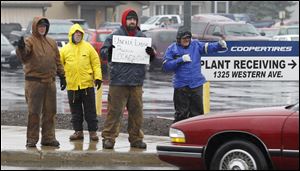
Union approves pact to end Cooper lockout
2/28/2012
Previously locked out Cooper Tire and Rubber employees from left, Jason Lotz, Rory Massillo, Greg Bailey, and Terry Halliwill, picket outside the plant in Findlay last November.
FINDLAY -- After dragging on for more than 13 weeks, the lockout at Cooper Tire & Rubber Co. is over.
On Monday, union members in Findlay approved a new, five-year contract by a 627-321 vote. Employees could be back in the tire plant this week.
"We did the very best we could. We did manage to achieve a lot of things, and we were short of achieving some things we set out to do," said Rod Nelson, president of United Steel Workers Local 207L. "We're glad we're able to finally put some closure to this."
The two-tier wage system will remain in place; however, second tier will now top out at 85 percent of what top tier workers make. Previously, that class topped out at 80 percent. Also a win for the union was the removal of a company proposal to re-evaluate all jobs in the plant and adjust pay levels accordingly. The provision had drawn ire from the union for its potential to cut wages and because the union argued it did not explicitly say how much money employees could expect to make in the future.
In a statement issued Monday evening, Cooper said it was pleased to have reached an agreement and is looking forward to employees returning to work.
"While enormous time and effort was involved in reaching this labor agreement, leaders from the company and the union share a belief that the new contract will enhance the competitiveness of Cooper's Findlay tire plant through improvements in productivity," the statement read. "An orderly return-to-work plan will be communicated before the end of the week."
Pat Gallagher, a United Steelworkers subdistrict director, said the 1,050 employees who have been locked out since Nov. 28 will begin returning to their jobs within three to five days.
"They have to clean the plant out, make sure all the product was gone, and we'd start over. They'd probably start back in phases," Mr. Gallagher said.
Full details of the contract have not been officially released, though a summary posted on the United Steelworkers Local 207L Web site said workers will be eligible for quarterly bonuses based upon attendance improvement, and health-care premium increases will be capped at 10 percent per year. There are some changes to vacation caps and retirement plans for new hires, and new minimum performance levels would be set.
The summary also said the agreement will provide wage adjustments based on the consumer price index for each of the five years of the contract, and that would break down like this:
Employees hired before Jan. 1, 2009, would receive $800 payments in 2012, 2013, and 2014. In 2015 and 2016, they would receive an amount that would vary between $0 and $1,000 based on the change in the consumer price index.
Employees hired after Jan. 1, 2009, would receive a $1,200 payment in 2012 and 2013, and increases of 10 cents per hour worked in 2014, 15 cents per hour worked in 2015, and 20 cents per hour worked in 2016.
All of the provisions of the contract offer were not confirmed with the company.
The last contract Cooper had with the USW expired Oct. 31. The two sides were not able to come to an agreement before that point, and continued working while negotiating until late November, when Cooper made what it then called its last, best offer. That was rejected the weekend after Thanksgiving, and Cooper locked out the workers the following Monday.
Negotiating teams from Cooper and United Steelworkers returned to the bargaining table Feb. 21 after a several-week hiatus. By Thursday, the two sides had come to a tentative agreement, which was presented to union membership Saturday. Company officials said Monday the lockout cost them $11 million in the last quarter of 2011, and was expected to top $40 million if the contract was ratified Monday. Much of that relates to costs associated with reduced production in Findlay.
Contact Tyrel Linkhorn at: tlinkhorn@theblade.com or 419-724-6134.